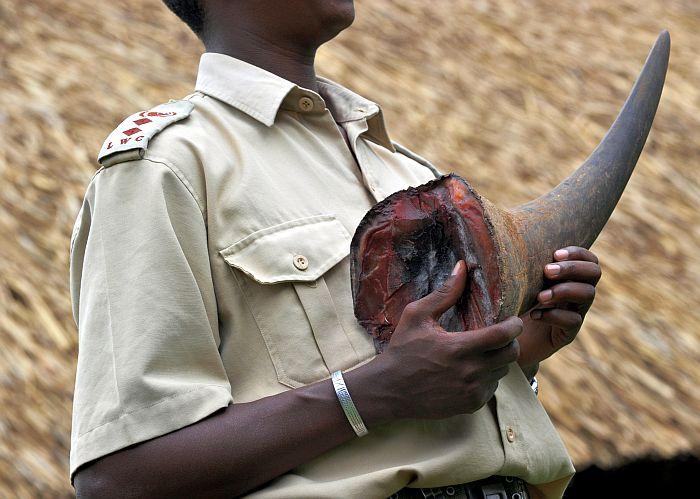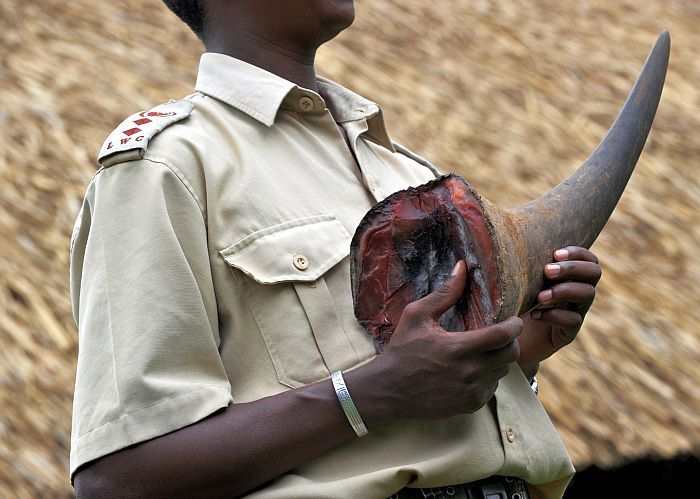WASHINGTON—As representatives from 177 nations, signatories to the Convention of International Trade in Endangered Species (CITES), meet in Bangkok, Thailand, to discuss the problem of rhinoceros poaching, the nonprofit Environmental Investigation Agency calls for trade sanctions against Vietnam for failing to address the burgeoning illegal trade.
Vietnam is currently the largest market for rhino horns, many of which are illegally smuggled from Africa, where around 1,500 have been poached over the last three years, according to a report from the Environmental Investigation Agency (EIA) released Monday.
The report, titled “Vietnam’s Illegal Rhino Horn Trade,” accuses Vietnam of inaction and says high-level Vietnamese officials are involved with criminal syndicates in rhino horn smuggling operations.
“Vietnam and Vietnamese diplomats have been shown to be at the center of a massive illegal rhino horn trade that is fueling the biggest rhino poaching crisis in over 30 years,” Allan Thornton, president of EIA, said in a statement.
The EIA is calling for CITES and the United States to impose trade sanctions on Vietnam until it complies with all its CITES obligations.
“Vietnam must enact and enforce a total domestic ban on all rhino horn trade and enact strict measures to combat Vietnam’s criminal syndicates driving the poaching in South Africa,” Thornton said.
According to rhino watchdog, SavingRhinos.org, “freshly cut” rhino horn can fetch from $25,000 to $40,000 per kilogram (2.2 pounds) in Vietnam.
The EIA report details how Vietnamese officials working in Africa buy rhino horns illegally and use diplomatic immunity to smuggle them out of the country.
On one occasion a Vietnamese Embassy official was caught on tape doing a rhino horn deal right in front of the embassy in South Africa’s capital, Pretoria. On another occasion, the deputy head of a Vietnamese government office was caught with 10 envelopes of cash at Hanoi airport after using diplomatic immunity to smuggle horns out of Africa for “friends and colleagues,” states the EIA report.
Rhino Horns Prized, Now Believed Cure for Cancer
Until recently, Vietnam had its own rhino population. The Javan rhino had one horn up to 10 inches long and a smaller head than its African counterpart.
The last Vietnamese rhino is believed to have died in 2010—a Javan rhino that was found dead in Vietnam’s Cat Tien National Park. According to the World Wildlife Fund (WWF), which inspected the body, the rhino had been shot and its horn hacked off.
Rhino parts, including the horn, skin, and even feces, are used in traditional Vietnamese medicine. Rhino horn powder is used in particular to treat fevers and convulsions.
Demand for rhino horns has surged more recently as rhino horn is touted as a cure for cancer. It has also gained popularity as a luxury item for wealthy Vietnamese who believe it relieves hangovers, EIA reports.
The EIA says Vietnam officials have done little to counter the belief in the therapeutic value of rhino horns or to inhibit illegal trading.
“Until very recently, Vietnam itself had reportedly not seized a single illegally imported rhino horn or prosecuted a single individual for illegal trade since 2008,” the report says.
The EIA, along with the Animal Welfare Institute (AWI) and the International Fund for Animal Welfare (IFAW), has filed a U.S. Pelly Petition on Vietnam’s illegal rhino horn trade with the U.S secretary of the interior.
Under that process, if it is certified that Vietnam is “undermining an international conservation agreement,” President Barack Obama has the authority to impose trade sanctions until full compliance with CITES rhino regulations is reached.






